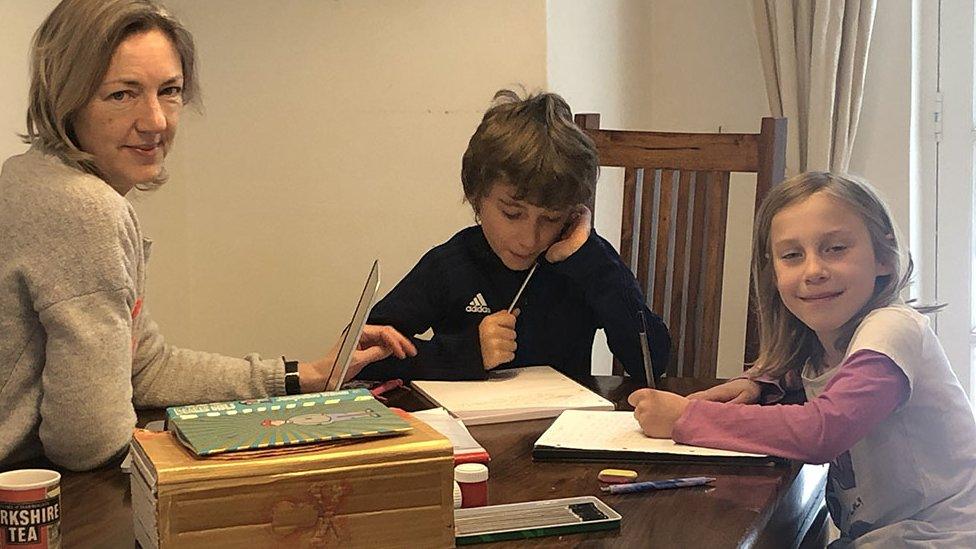Coronavirus: Welsh home schooling 'impossible' for non-speakers
- Published
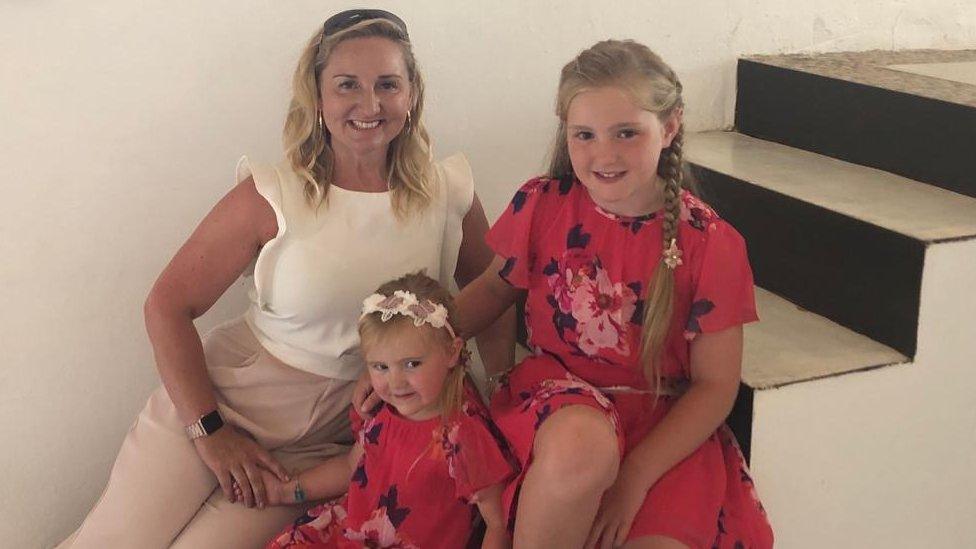
Louise said trying to home school in Welsh had made her re-think her decision to send her children to a Welsh-medium school
About 12 weeks into lockdown, Louise Ballinger realised her daughter had not spoken any Welsh.
Louise, from Cardiff, said trying to home school in a language she cannot speak was a "nightmare".
Teaching bodies have called for better support for parents after the education minister said an element of home learning would continue in September.
The Welsh Government said it had provided support and advice to parents to help their children learn at home.
From Monday many pupils will return to the classroom in most parts of Wales for the first time since lockdown began, in a phased return to check in with teachers.
Ministers have acknowledged that home schooling during the pandemic is challenging for parents.
But for some parents, whose children attend Welsh-medium schools, they have been trying to keep their children up to speed in a language they cannot read or speak.
In Cardiff about 63% of pupils in Welsh-medium schools come from homes where no Welsh is spoken.

There are concerns some children are being left behind due to a lack of online lessons
Louise and her husband are considering moving their nine-year-old daughter Ella to an English school, after finding home schooling her "impossible".
With homework and tasks sent in Welsh, the couple have been unable to help their daughter keep up with her learning, and have hired a tutor to try and stop her falling behind.
"It's been a complete nightmare. No one in my family speaks Welsh," she said.
Louise said she wanted her children to learn through Welsh as she felt it was important to speak the national language and she wanted them to be bilingual.
But following lockdown, she and her husband are also re-thinking their decision to send their youngest daughter, Amelia, 4, to the Welsh-medium school.
She said live video classes with other pupils would have allowed her daughter to speak with her friends and would have made a "world of difference", but these were not currently available.
"English speaking families are keen to educate their children in Welsh. We just need more support," she said.

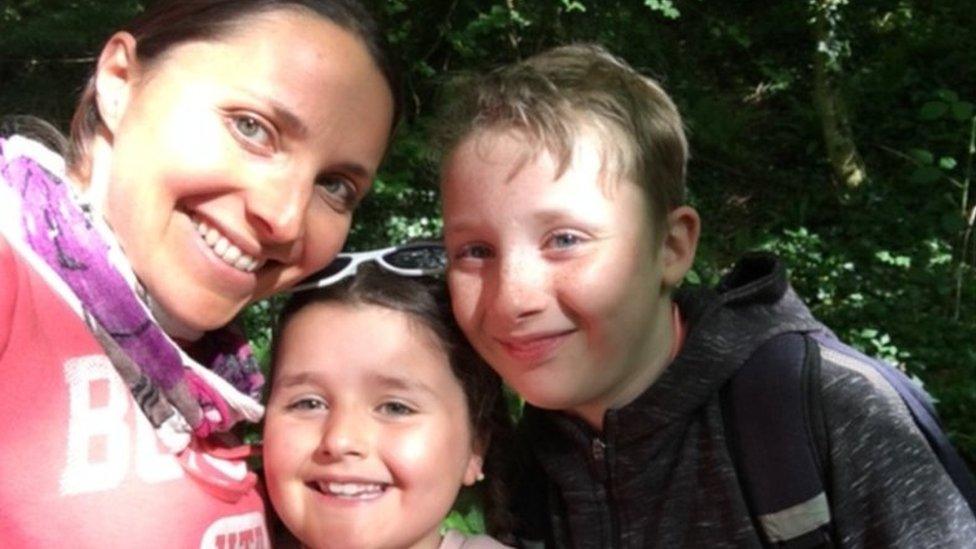
Marie Jezequel said she had found trying to home school in Welsh really hard
Marie Jezequel said: "Weeks go by where we haven't done any of the tasks in Welsh, or maybe just the spelling tasks.
"For the other tasks and the writing, we've just done them in English."
Ms Jezequel's eldest son, Teilo, 10 and youngest, Ellie, eight, both go to a Welsh-medium primary school.
She said while the teachers had been very supportive the children had not had any live contact with them at all. She said they were looking forward to going back to school.
"School is about more than learning. It's for their wellbeing also. Both of them have felt low sometimes. For those reasons I'm glad they'll be going back to school," she said.


Jade Williams has found home-schooling in Welsh a positive experience
For Jade Williams, from Barry, the experience of home schooling in Welsh has been much more positive.
Her five-year-old son Rufus is in reception at a local Welsh-medium school.
While she does not speak the language, teachers and the parents of her sons' friends have helped her during lockdown to translate and keep him up to speed.
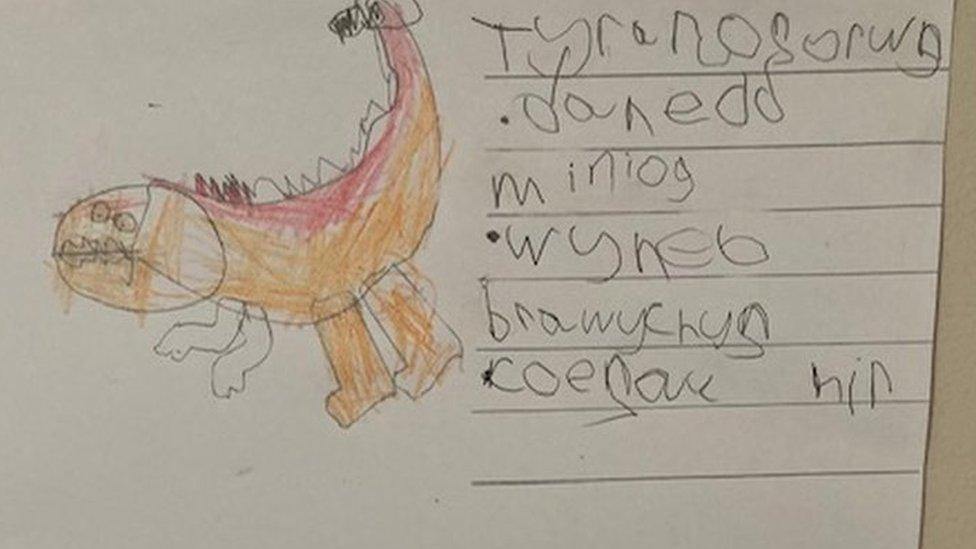
Rufus, 5, has been enjoying doing his school tasks
A number of teaching unions, including the Welsh teacher's union, UCAC, and the National Association of Head Teachers have said more needs to be done to help non-Welsh speaking parents with children at Welsh-medium schools.
NAHT Cymru said teachers had "responded creatively" to lockdown, with some providing live catch-ups over internet platforms, while others had done recorded lessons, but that "education would never be the same".
Pressure group for parents for Welsh-medium education, Rhieni Dros Addysg Gymraeg (RHAG), said it was worried parents were facing "undue pressure" and needed support when the term starts in September.

Elin Maher, from Rhieni Dros Addysg Gymraeg, said parents needed to tell them of their experiences so they could take them to ministers
Elin Maher, from RHAG said the Welsh Government needed to ensure pupils were able to continue learning by investing in digital teaching if an element of home schooling was to continue in the autumn.
"We have to understand, we live in a community where English is the dominant language, so Welsh immersion needs to happen often," she said.
"The way to do it is through regular contact with the language, in school and in our everyday world. We have to recreate and re-devise those opportunities.
"We are not alone in this. This situation is similar for many minority languages in Europe and elsewhere."
A Welsh Government spokesman said all parents were facing "challenges with learning from home", and it had provided guidance to schools during the pandemic.
"Our stay safe, stay learning framework includes dedicated support for Welsh-medium learners whose families don't speak Welsh. This includes advice for parents and carers on how they can support their children to use the Welsh language while at home," he added.
- Published17 June 2020

- Published19 April 2020
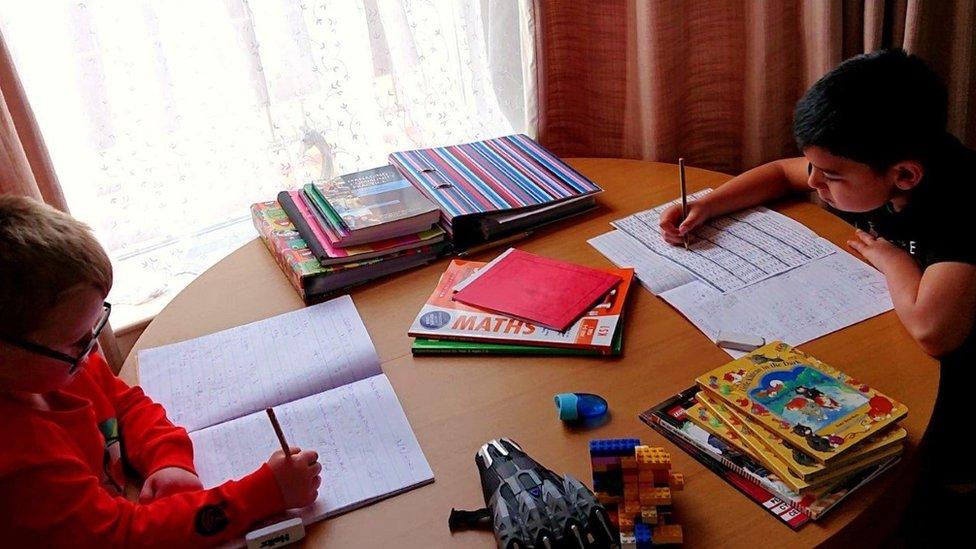
- Published8 April 2020
